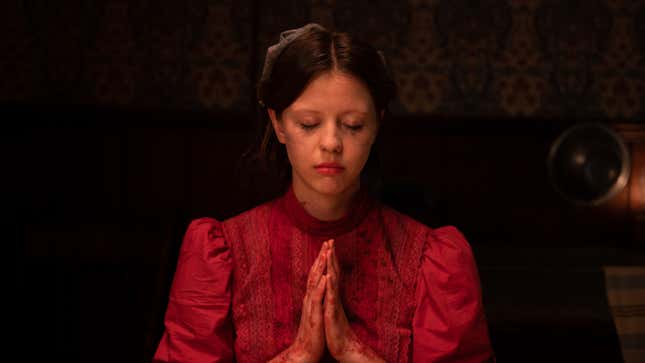
With Pearl, writer-director Ti West both embraces and elevates what horror movies can do, in a way that further solidifies his standing as one of the best things to ever happen to the genre.
A prequel to West’s terrifying X—his second film in the “XCU,” with a third, MaXXXine, on the way—Pearl tells the bloody and tragic origin story of its sexually charged, identity-starved title character, played by Mia Goth, in a performance worthy of Movie Star status. By mining Pearl’s history, a violent (and at times intentionally Grindhouse-y) cautionary tale about the dangers of suppressing one’s desires, both carnal and otherwise, West taps thematically rich veins in ways that few of his contemporaries have ever explored in this space. Working with a script co-written by Goth, West effortlessly wields Pearl’s trauma-laced backstory like a scalpel while his star slashes her way through the film’s 102-minute run time, catapulting Pearl into the ranks of horror’s most satisfying and unsettling marriages of character-first storytelling, as well as making it one the year’s best movies of any genre.
Pearl trades in X’s gritty, late-’70s porno visual aesthetic for a technicolor palette as West draws back the curtain on the origins of Goth’s very old, very murderous iteration of Pearl in X. Her violent downfall starts at the end of World War I, in 1918, when Pearl’s attempts to flee an insular life on a Texas farm lead to a Tinseltown eager to prey on dreamers like her. Pearl uses movies to escape not just from her day-to-day life, but from her fractured self. In doing so, she becomes imprisoned within a nightmare of her own making.
Pearl’s obsession with movies blurs the boundary between aspirations she wishes were real and a reality she seems incapable of accepting. Her husband wages trench warfare abroad while she’s stuck at home with an emotionally abusive German mother (Tandi Wright) and a creepy, wheelchair-bound father (Matthew Sunderland). Pearl sets out to be a star, with disastrous results: though her fantasies are full of fantastic color, she applies a black-and-white mentality to achieving them that leaves zero room for nuance or error. Pearl’s inability to adapt to the harsh consequences of unrealized expectations leads her down a deadly path, especially as she becomes increasingly aware of her tenuous grasp on reality.
Goth is quite convincing with her portrayal of Pearl as a doe-eyed farm girl, but she and the movie are at their most compelling when her character struggles to see and experience the real world as everyone else does. In a pivotal scene depicting a dance audition, Goth’s reaction is heartbreaking. The way West lets such character moments breathe helps put audiences in the moment with Pearl, who has difficulty understanding how painful the world can be for those who don’t know how to cope with it. Even though we know how Pearl’s story ends, we share her dread and unease in the events that shape her murderous ending.
It’s a delicate and tricky tightrope that West walks here, trying to create sympathy for a hero destined to become a ruthless villain. Once he gets past the first act’s somewhat distracting visual callbacks to X, West charges forward on steadier narrative ground as he digs deeper into Pearl’s fragile mental health, filtered through her infatuation with The Projectionist (David Corenswet).
Much of Pearl’s greatness rests on Goth’s talented shoulders. She is fiercely committed to every frame of Pearl’s movie-like fantasy world, which makes her performance all the more haunting and haunted as that fantasy unravels. The broken pieces of the movie in her head prove fatal for those in her path in increasingly over-the-top ways. But there’s no one in the audience who can’t relate to having a dream go unfulfilled, and by making Pearl relatable West and Goth ground Pearl’s inevitable spiral with emotional honesty. The demented set pieces will satisfy genre fans, but they also resonate more deeply due to Pearl’s underlying motivations.
That attention to character-driven horror is one of Pearl’s many charms. Combined with West’s use of surreal imagery and production design to distinguish this film from its predecessor—as well as the slow-burn tension and set pieces that made X so endearing—the film narrowly avoids camp by depicting the title character’s emotional struggles in external, physically violent ways.
Violence in the world of Pearl is as inevitable and immutable as gravity, West suggests. But unlike X’s dusty fun, a melancholy atmosphere looms over the carnage, all underscored by West’s fascination with the tragic ends that come from building future hopes upon the shakiest present realities. If only more horror movies dared to dream as big with such emotionally charged results.